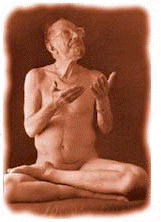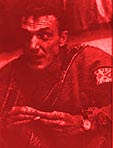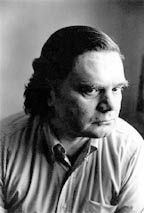2001 - 2002
Season
5.1
The Wild West Wind / Remembering Allen Ginsberg
A lecture by Susan Edwards
October 16, 2001 |
|
 |
 |
| Photo
by Steve Miles |
|
|
The talk will be inspired by Susan's recent publication of The Wild
West Wind/Remembering Allen Ginsberg. Her personal reminiscences
of a twenty-five year collegial relationship with Allen Ginsberg is
an invitation into the raw heart of the twentieth century's greatest
visionary American poet. While touching on many facets of a complex
man, her talk will consider the sometimes outrageous efforts by the
famed Beat poet to bring the meditative practices of Tibetan Buddhism
to the poet's path.
Susan
Edwards is a writer, book artist and metaphysician. She taught writing, sacred
literature and did collaborative performance at Naropa University from 1979 to
1990 where she co-founded the Book Arts Program and directed the undergraduate
Writing and Poetics Department. In her current work, she seeks to bring images
and text together in aesthetic and digital ways. She also has her own company,
The Practical Mystic, that produces and distributes tapes, chapbooks, broadsides
and offers lectures and classes.
5.2
Lew Welch
by Bill Scheffel
November 20, 2001 |
|
 |
 |
| Photo
by Jim Hatch |
|
|
Lew
Welch is a well-loved poet of the Beat circle. His writings reveal an uncanny
understanding of Zen Buddhism, a Taoist love of nature and the hermit's way, and
a street-wise American lingo that always remains tender. Few American poets exceed
Lew Welch's ability to hone language into phrases of wit and intelligence that
stick in the mind. Consider his insight into insights: “The mind grows in
a flickering kind of way. Sometimes an insight comes too early to be fully understood.
At other times, we are shocked that it came, being so obvious, so late.”
Bill Scheffel is a poet and teacher. He has taught Chance Synchronicity
& Mind-Writing—a creative writing workshop that draws on the creative methods
of John Cage, Chögyam Trungpa, Allen Ginsberg and others—in Boulder, Minneapolis,
Kansas City Philadelphia and Juneau. He has taught writing workshops in the Boulder/Denver
community for six years. He has read his poetry on National Public Radio's All
Things Considered and has published in numerous journals. Bill also teaches Writer's
Craft and Shambhala Meditation Practicum at Naropa University. In both courses
he integrates mindfulness and awareness exercises with the creative process.
5.3
Michael Ondaatje
by Katie Yates
January 15, 2002 |
|
|
|
|
In The Skin of a Lion (1987) and Anil's Ghost (2000)
are texts which use an evolving set of narrative conventions which openly
defy poetry's best attempts to circumscribe the language of simple human
experience. From within the landscape of American poetry, I would like
to show how Michael Ondaatje sustains poetic narrative in the face of
subtle hints that such writing couldn't make sense, and to make suggestions
as to where such brilliance leads rhetorically and otherwise.
Katie Yates
is currently working on a book of aikido poems which will include a series of
prints. She is a substitute teacher and editor of manuscripts for a gaming company
in California that her sister owns.
5.4
James Schuyler
by Gary Allen
February 19, 2002 |
|
 |
 |
| Photo
by Gerard Melanga |
|
|
James Schuyler is most famously associated with New York poets John
Ashberry and Frank O'Hara. In the spirit of Auden, his style is characterized
by an effortless elegance and wit that supplely tracks the mercurial
nuances of thought and perception. His poetry sparkles with a daily
appreciation of the phenomenal world. His works include Freely Espousing
(1969), The Crystal Lithium (1972), and A Few Days (1985).
His book, The Morning of the Poem, won the 1981 Pulitzer Prize
for Poetry. A novelist and art critic as well, he was elected a Fellow
of the Academy of American Poets in 1983.
Gary Allen is the author of The Missionary Who Forgot His Name and
Other Poems (Selva Editions, $10.00). He has B.A. and M.F.A. degrees
in Creative Writing from Naropa University. From 1995 to 2000 he lived
in South Korea teaching English in various universities, translation
classical Korean poetry, and traveling around Asia. He is currently
an English instructor at Metro State College and Community College of
Denver, a director of Shambhala Training, and a teacher of meditation
in prisons.
5.5
The Naropa University Audio Archive Project
by Steven Taylor, John Hansen, Jane Dalrymple-Hollo,
Mary Kite, Alan Hartway, and Randy Roark
March 19, 2002 |
|

|
|
Live recordings of William Burroughs, Allen Ginsberg, Meredith Monk,
Amiri Baraka, Gregory Corso, and others in movements that document
the changes and challenges of American consciousness will be presented
in a lively panel discussion concerning Naropa
University's Audio Archive Project. This group of passionate artists
and scientists is intent upon saving what is considered to be one
of the three most important audio archives of twentieth-century poetry
and literary culture.
John
Hansen oversees CU-Boulder's contribution to a multi-university research effort
for audio information retrieval for the National Gallery of the Spoken Word. Randy
Roark is a poet, producer, and editor with Sounds True, a nationally known audio
book publisher. Alan Hartway teaches philosophy, mythology, and ethics at Naropa
University. Conservator of rare books Jane Dalrymple-Hollo has written and administered
a consultation grant from the National Historical Publications and Records Commission
on behalf of Naropa's Audio Archives. Musical arranger and performer Steven Taylor
has a Ph.D. from Brown University and is currently the project director of Naropa's
Audio Archives. Poet Mary Kite spearheaded the movement to digitize Naropa's Audio
Archives.
5.6
“Poetry Has Helped Me Make Films”
A talk by Stan Brakhage
April 16, 2002 |
|
|
|
|
Esteemed filmmaker Stan Brakhage will give a farewell talk on how
poetry has helped him to make films—especially the poetry of
Victor Hugo. Considered "the world's foremost living experimental
film maker" (Ganguly, Sight & Sound, 20), this account will reel together
the lives of poets who influenced the artist and his highly praised
experimental avant-garde work. While roommates with Robert Duncan
and Jess Collins in San Francisco, he befriended poets Rexroth, Creeley,
Zukofsky, and many others. Later travels to New York brought close
associations with Dorn, Olson, Ginsberg, and Kelly. All the while,
in cities and mountains, the work went, and goes, on.
Stan Brakhage was born in Kansas City, Missouri on January 14, 1933.
Educated at Dartmouth College in 1951, he dropped out as a freshman.
He ran a small theater in Central City, Colorado before attending
the Institute of Fine Arts in San Francisco in 1953. In 1954, Brakhage
went to New York where he became acquainted with avant-garde filmmakers
include Maya Deren, Marie Menken, Willard Maas, Jonas Mekas, and Kenneth
Anger. He began presenting his own films in public and lecturing on
his own and other people's works in 1960. His major works, The
Art of Vision and Dog Star Man, were completed in 1964.
He competed the major abstract film The Text of Light in 1974.
In 1981, Brakhage began teaching at the Boulder campus of the university
of Colorado. The recipient of numerous film awards and five retrospectives
at the Museum of Modern Art, he was most recently honored by the selection
of Dog Star Man by the U.S. Library of Congress for inclusion
into the national film registry.
|

